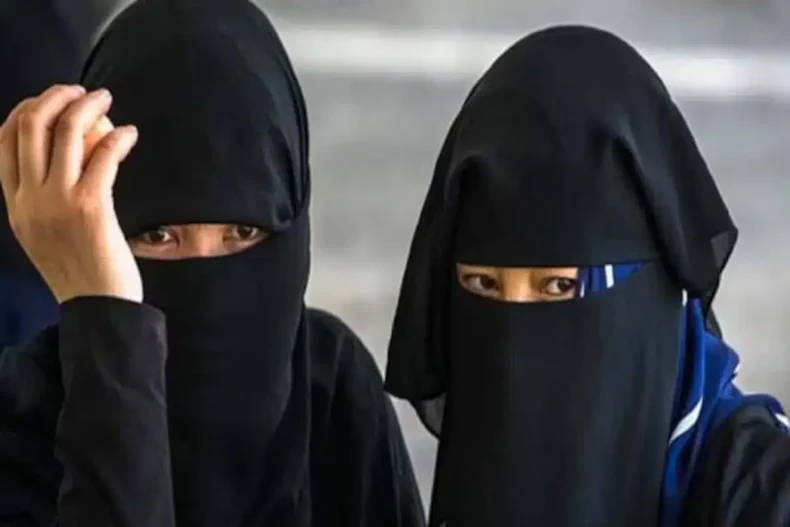
The Karnataka Hijab Case has been sent to the Chief Justice of India and a larger bench for a final decision after the Supreme Court recently issued a split decision.
The two-judge bench of the Supreme Court expressed two opposing opinions on October 13. One Justice supported the decision of the Karnataka High Court, which stated that donning a headscarf (hijab) is a matter of choice and not a required religious practice. While the opposing judge rejected the High Court’s judgment.
How did hijab controversy start?
- The issue started in July 2021 when Udupi PU college gave a uniform code, and the students who went to college wearing hijab were discriminated against students complained about the issue on different social media platforms and there it became the national talk.
- Though with all the issues out there, college management allowed the girls to wear hijab and burqa but not in the classrooms.
- Since it became a national topic, the Karnataka Government decided to set up an expert committee, which will look into the case, and till then students were asked to wear the uniform prescribed by the college.
- A writ suit was submitted to the Karnataka High Court at the end of January 2022, asserting that wearing a headscarf is a basic right under Article 25.
- In the meantime, the Karnataka Government issued a decree stating that students must enter colleges wearing the required uniform; otherwise, they will violate the law governing equality and public order.
- In the meantime, protests persisted under the justification that because Christian girls are permitted to wear crosses and Hindu girls are permitted to wear bindis and bangles, the Muslim minority is being discriminated against. Students are required to adhere to the uniform code until the outcome of the case, according to a High Court order.
- Another petition asking for the wearing of headscarves at educational institutions on Fridays and during the month of Ramadan was submitted to the Karnataka High Court.
- In a High Court filing, the Karnataka government argues that prohibiting headscarves in educational settings does not violate the Constitution’s Article 25. Although wearing a headscarf is covered by Article 19(1)(a), there are some exclusions listed in Article 19. (2).
- The Karnataka High Court ruled on March 15, 2022, that donning a headscarf is not a requirement for practicing Islam. Additionally, kids are not allowed to violate the requirement for a uniform code in schools
- The same day, that is. Students appealed the High Court’s decision to the Supreme Court on March 15, 2022. Additionally, students assert that the right to privacy covers wearing a headscarf.
- The Supreme Court agreed to hear the petition in July 2022.
- The Supreme Court issued its split decision on October 13, 2022, and the case was then sent to a larger bench.
What did the two-judge panel emphasize in its decision?
Justices Hemant Gupta and Sudhanshu Dhulia made up the bench. According to Justice Gupta, prohibiting the hijab does not infringe on Muslim girls’ fundamental rights to freedom of expression and choice. He added that he concurred with the government of Karnataka and the High Court’s conclusion that “hijab does not a religion-neutral category. And secularism should guide how educational institutions are conducted.
While Justice Sudhanshu Dhulia disagreed with Justice Gupta, stating that the decision made by the Karnataka Government and the High Court was incorrect and that the hijab is a fundamental component of Islam.
The Supreme Court’s decision in the Bijoe Emmanuel Case, which held that the court only needed to consider three criteria, namely whether the practice is widespread, established, and real or genuine, was cited by Justice Dhulia in his decision. The hijab case, he added, is meeting all three of these requirements.
Justice Dhulia said that there shouldn’t be any barriers to girls receiving an education and that preventing them from donning a headscarf would not be a constructive action if it prevented them from receiving a formal education.
The case has been forwarded to a larger bench and CJI, nonetheless, because of these divergent viewpoints and the decision.
The headscarf would be prohibited in schools up until the final decision is rendered, according to the statement made by the Karnataka Minister for School Education. And the girls who wish to do so will be moved to the schools where doing so is permitted.
DO FOLLOW: What is a ‘split verdict’, and what happens next in such cases
READ MORE:
- PM Launched the 4th Vande Bharat Express train in Himachal’s Una and laid the foundation stone for Bulk Drug Park, Today
- 36th National Games of India 2022 : Glimpses of the event.













